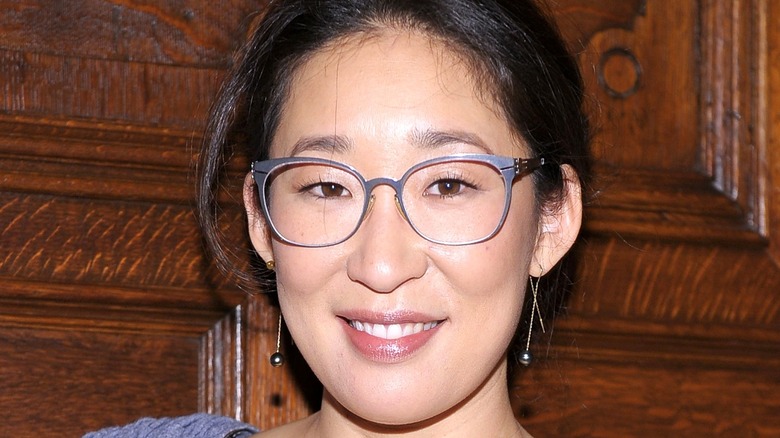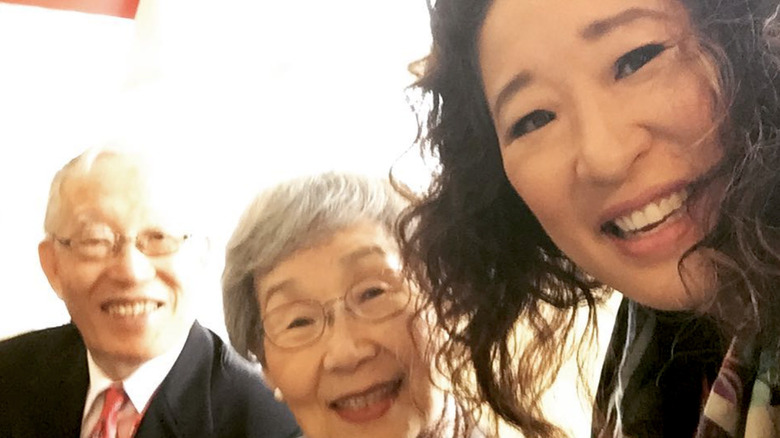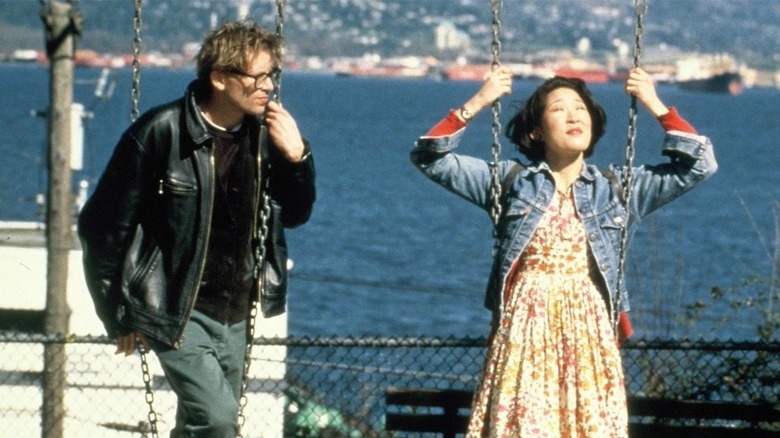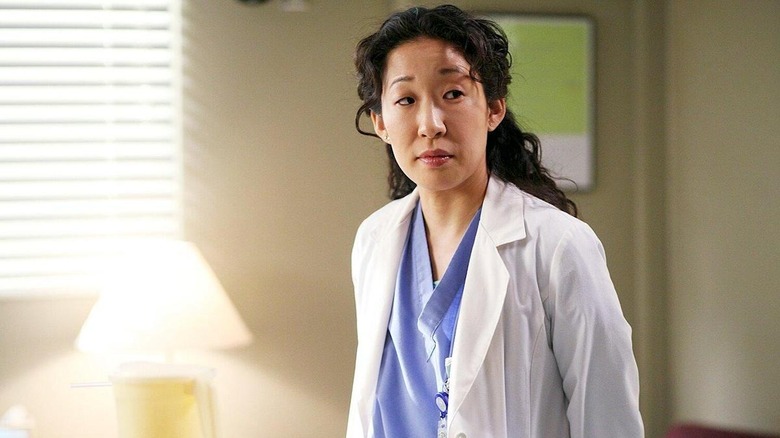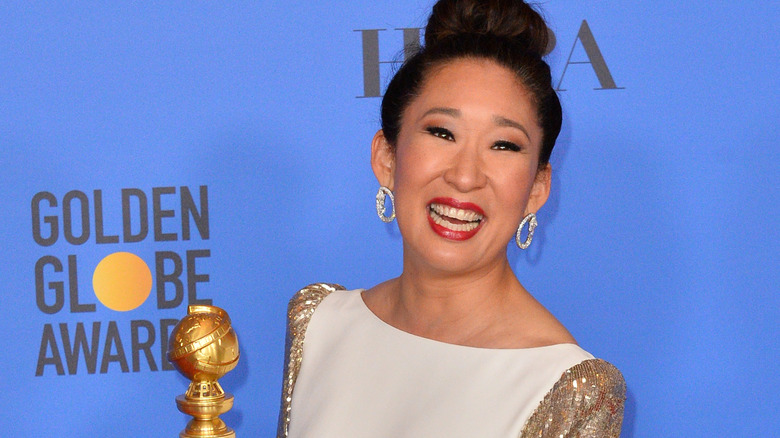The Transformation Of Sandra Oh From Childhood To The Chair
One of Netflix's newest original series, "The Chair" is a comedy drama about Dr. Ji-Yoon Kim, played by the one and only Sandra Oh, as she begins her time as the first female chair of the English department at the fictional Pembroke University. The series has gotten great reviews and is well-liked by audiences, with many hoping to see a second season in the future.
While Oh is fantastic in the main role and will probably return if Netflix renews the show for another season, the talented actress has already accomplished quite a lot in her illustrious career up to now. Playing so many different roles, including a Catholic nun, a cardiothoracic surgeon, a personal assistant at a sports agency, an MI6 agent, and more, Oh has a lot of range to what she can do, and she has consistently gotten recognized for her work with nominations and major awards.
But what did her early life look like, and how did Oh go from being just a young Korean-Canadian girl dreaming of acting, to one of the most prominent and talented actors of the time? Here's the transformation of Oh from childhood to her most recent role in "The Chair."
Oh grew up in a Catholic Korean-Canadian family in Ontario, Canada
Oh was born in Nepean, a part of Ottawa, Ontario, to South Korean immigrant parents, Jeon Young-nam and Oh Jun-su. Her mother, Young-nam, is a talented biochemist, while her father is a successful businessman. While there weren't many other families of Asian descent living in the area, Oh appears to have had a happy and creative childhood, with a brother, Ray, and a sister, Grace. When she was younger, her parents were very supportive of Oh pursing her interests as long as she kept up her academics, and she started dancing ballet at age 4, with acting to follow soon after. Oh told the Chosun Ilbo, a South Korean newspaper, that "although I loved dance with all my heart, I knew I was not good enough to be a professional dancer ... Still nothing beats being on stage for me." Oh quickly realized that between dancing and acting, the latter was best suited for her, but her parents weren't exactly thrilled with her choice to pursue the arts professionally.
Speaking with Terry Gross in 2004 on NPR's Fresh Air podcast, Oh was asked if her parents had anything to do with her decision to start acting so young, to which her response was "Oh God, no." Their main reason for not wanting to encourage Oh's acting as an official job was because they understood the inherent racism and general pattern of rejection within the industry, thinking that "I don't want to put my child in a place where she's going to be rejected and hurt." But over time, as they began to understand how meaningful Oh's work really is, the actress proclaimed that "they are so amazingly supportive now." Oh even took her parents as her dates to the 2018 Emmys, with her mother telling Variety how proud she was of her. Oh's nomination that year made history as she became the first actress of Asian descent to be nominated in the Emmy category for Lead Actress in a Drama Series, for "Killing Eve."
She had a very successful start to her acting career
Even though Oh's parents weren't quite so supportive at first, they eventually came around, largely due to Oh's extreme passion and drive to succeed. In the same podcast with Gross, Oh went through her journey to acting, explaining how part of what allowed her to start working professionally at only age 16 was because of the bilingual aspect of the town she grew up in, with many people, including Oh, able to speak both English and French — though Oh also speaks fluent Korean. Oh stated that she "was able to get in there by doing the English version and the French version" of projects, allowing her to make "a little pocket change here and there."
Oh then went on to study acting at the National Theatre School of Canada, and once she transitioned into fully working, she got a few great main acting roles fairly quickly. She had two major roles early on, one being the lead character in "Double Happiness," a film about a young woman who wants to be an actress but faces the challenges of her traditional Chinese family and the obstacles of racism in the entertainment industry. Roger Ebert gave the 1994 film three out of four stars for the Chicago Sun-Times, citing Oh's "warm performance" in the story that feels "like a long letter from a good friend." The role won Oh a Genie Award as well, which is basically Canada's equivalent to the Academy Awards.
But it was the other early major role that really stuck with Oh, playing the title character in the biopic "The Diary of Evelyn Lau," about the famous Canadian poet. While speaking with Gross in 2004, Oh said that "to this date, it's the piece of work that I'm most proud of," then explaining that it was this "harrowing" story that helped her parents realize "that what I was doing was meaningful."
Oh quickly became a trailblazer in TV and film
Although Oh was clearly already a star long before American audiences started noticing her, it's her performance as Cristina Yang in ABC's "Grey's Anatomy" that was arguably her breakout role. Oh was one of the original cast members of the beloved series, created by Shonda Rhimes, starring alongside Ellen Pompeo as Meredith Grey, Katherine Heigl as Izzie Stevens, Chandra Wilson as Miranda Bailey, and many more.
At first, Yang is just a surgical intern with Grey and a few others, but over the course of the first 10 seasons, Yang grows to become a resident, and then a cardiothoracic surgical fellow at Seattle Grace Hospital. By the end of Season 10, Oh simply felt like she had gotten all she could from the show and the character, and so she left "Grey's Anatomy." Oh's character has made a very big impact on the entertainment industry and our culture, with Alyana Santillana of Voices of Gen Z writing about how, despite Yang being intelligent and a doctor, she completely upends the "smart Asian" stereotype through her decision to not have a family in order to pursue her career, her confidence in her sexuality, and her defiant and strong attitude. Santillana shared that "Cristina's characterization inspired me, and many other young girls, to be unapologetically driven, to be self possessed, and to be unstoppable."
Of course, then comes along Eve Polastri of "Killing Eve," and she's proven to be just as influential. The show, whose first season was led by showrunner, writer, and executive producer Phoebe Waller-Bridge, is a monumental accomplishment in and of itself, featuring two complex lead female characters who just so happen to have a romantic obsession with one another. The main problem? Eve is an MI6 agent hunting down the other woman who is a psychopathic assassin named Villanelle, played by Jodie Comer. "Killing Eve" is critically acclaimed and loved by many, with Oh and her character being a main focus of the appreciation.
While she's already accomplished a lot, Oh is truly just getting started
Over the years, Oh's many different roles have really changed representation in entertainment and made a strong impact on many fans. But she's also received more visible acclaim and influence, evident in the many awards she's accumulated over the years. For just "Grey's Anatomy" alone, Oh was nominated for five Emmys and won a Golden Globe for her performance in 2006. She's won four Screen Actors Guild Awards over the years, for roles in "Sideways," "Grey's Anatomy," and "Killing Eve." The latter series has brought Oh more attention than ever, finally bringing her to the world stage, as she was also nominated for a prestigious BAFTA for Lead Actress. Although she didn't win, just getting nominated as a non-British actress is quite the achievement. On top of that, Oh also won a Golden Globe in 2019 for playing Eve.
Also, although it's sad to see how little Asian representation has come up to now, Oh is tearing apart stereotypes and expectations left and right, becoming the first Asian woman to host (and win) the Golden Globes award show (via The New Indian Express). With her 2019 win for Lead Actress, Oh also became the first Asian woman to win the award for almost 40 years, with Japanese actress Yoko Shinada being the last to win in 1980 for "Shogun." But Oh's impact stretches far beyond simple awards, and we will hopefully see more complex roles with diverse stories in the future, particularly for people of color and queer actors, with Oh likely to play a few herself.
While it's disappointing that there is still so little recognition for Asian women and men in Hollywood — though it's slowly getting better — hopes are high that Oh will continue her monumental career and reach even bigger heights (possibly an Oscar soon?), while also empowering other underrepresented men and women to do the same.
Who else is excited to see what Oh takes on next?
